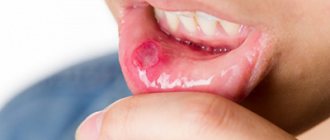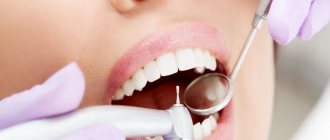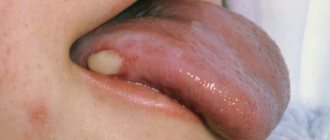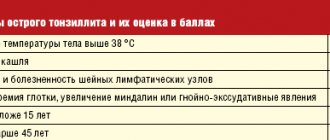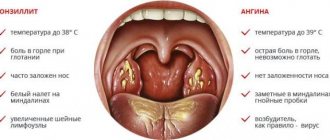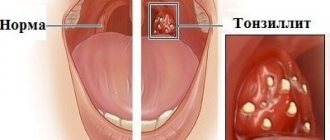Sore throat is one of the most common infectious diseases that affects our tonsils (tonsils). In the medical literature you can find another name for this diagnosis: acute tonsillitis. Purulent sore throat in an adult is an infectious disease that is provoked by pathogenic microorganisms, namely hemolytic streptococci of groups A and B, and less commonly staphylococci.
The disease is extremely contagious. The disease is transmitted not only by airborne droplets. You can become infected through contact when sharing the same dishes or towels with a sick person. Both children and adults are susceptible to the disease.
This disease has a clearly defined seasonality and most often appears in the autumn-spring period.
Despite the fact that many people treat the diagnosis of “acute tonsillitis” as something natural and commonplace, nevertheless, this disease is not as simple as it seems. If there is a careless attitude towards it, when proper treatment of purulent sore throat in adults is not carried out, severe complications can develop, involving associated organs (kidneys, joints and myocardium - heart muscle) in the chronic inflammatory process.
What are lacunae
The tonsils are covered on the outside with a mucous membrane with depressions called lacunae. They protect the body from pathogens and ensure filtration of everything that enters the mouth.
In the follicles that make up the tonsils, lymphocytes mature and are released onto the surface of the lacunae to destroy microbes. In a healthy person, the lacunae cleanse themselves.
Causes
The decisive factor in the development of lacunar tonsillitis is an infection in the mouth or nose. Upon contact with a sick person, the risk of infection increases to 90%. Germs are transmitted by airborne droplets. Sputum and saliva released when sneezing or coughing enter the mucous membrane and bacteria spread along it.
In addition, the pathogen exhibits pathogenic properties on the body when it is weakened - with prolonged irradiation and chemotherapy, tuberculosis, as well as an incorrectly selected treatment regimen with corticosteroids, antibiotics or immunosuppressants.
Why is rinsing prescribed?
When immunity decreases, the production of lymphocytes decreases, and an inflammatory process begins in the lacunae. As a result of the disease, the ability to cleanse itself decreases and the recesses of the tonsils become clogged with purulent plugs.
The person’s health deteriorates and the following appears:
- heat,
- severe sore throat
- difficulty swallowing.
With frequent such manifestations, doctors diagnose chronic tonsillitis. And rinsing is prescribed to prevent the spread of infection to other organs.
This stops the exacerbation of tonsillitis and in some cases eliminates the need for surgical intervention to remove the tonsils. Washing is almost painless, as doctors use modern equipment to carry it out quickly.
Important! It is dangerous to clean lacunae on your own due to the risk of damaging the delicate mucous membrane of the palate and pharynx.
Complications with purulent sore throat
The disease is dangerous due to its complications, which can affect not only the respiratory system, but also spread to other human organs.
One of the common pathologies is the transition from an acute form of the disease to a chronic form (chronic tonsillitis). In chronic tonsillitis, inflammation is constantly present in the tonsils, and exacerbations occur 2-3 times a year, and in severe cases, more often.
Delayed treatment of the disease can lead to inflammation of the heart muscle (myocarditis), joint diseases (rheumatoid arthritis) and kidneys (glomerulonephritis and pyelonephritis). It is possible that a sore throat may develop into an abscess. This happens when the infectious pathogen has little space in the thickness of the palatine tonsil, and streptococcus begins to look for new sites for itself. Thus, inflammation can move to the paratonsillar and parapharyngeal tissue and provoke a paratonsillar or parapharyngeal abscess.
The pathologies listed above are powerful arguments for promptly starting treatment for purulent tonsillitis.
Types of washing
Purpose of appointment: to remove pus from the lacunae and treat them with a drug. After this, the patient's condition improves significantly.
Specialists carry out the procedure in different ways:
syringe. A solution is drawn into a 20-gram syringe. Instead of a needle, a special nozzle with a curved end is put on so that the solution falls directly on the stopper. The liquid under the pressure of the piston is fed into the lacuna and flushes it.
Washing the tonsils- Vacuum method of washing tonsils . The tonsils are anesthetized, a vacuum suction cup is attached to them, through which the purulent contents are pumped out. After this, the medicinal composition is pumped into the lacuna.
- Ultrasonic washing of tonsils . The cleaning principle is based on a combination of cavitation and ultrasound. Air bubbles form in the washing liquid, and when they rupture, the membranes of microbial cells are damaged.
The Kuntsevo Medical Center has modern otolaryngological equipment, which allows the operation to be performed as quickly, efficiently and painlessly as possible.
Symptoms of lacunar tonsillitis in children
The signs of a sore throat in a child are the same as in adults, only they appear more acutely. The disease progresses rapidly, because The child’s immunity is not fully formed and the defenses cannot resist infection.
Already from the first day, the temperature rises to 40-40.5 ° C, against this background diarrhea and vomiting appear. Some parents believe that there is no need to lower the temperature, because the body fights the infection on its own. This statement is completely false. It is important to immediately reduce the temperature if it rises above 38°C, otherwise convulsions may begin.
When caring for a baby, relatives need to respect communication boundaries and wear a medical mask. Fortunately, lacunar tonsillitis in children rarely leads to complications.
Often this disease in children is treated in a hospital setting. If the condition worsens within 3-4 days, the child is hospitalized. In the hospital, instrumental washing of the tonsils, droppers, intravenous and intramuscular injections quickly improve the baby’s condition.
How is the procedure performed?
All rinsing methods are based on exposing the tonsils to a stream of disinfecting solution or vacuum. Cleaned tonsils are treated with medications.
Processing each tonsil takes from 30 seconds to 1.5 minutes. The time depends on the choice of type of cleaning of the lacunae and the depth of damage to the lacunae.
Important! Before the procedure, you cannot eat for 1.5-2 hours. This is due to the fact that rinsing provokes a gag reflex.
To prevent possible discomfort, the doctor treats the tonsils with a local anesthetic with lidocaine or novocaine in the form of a spray.
Symptoms of lacunar tonsillitis
Signs of lacunar angina include general symptoms of intoxication and local inflammation of lymph tissue.
Upon examination, inflammation is visualized on both sides; one tonsil on one side is rarely inflamed. The clinical picture of lacunar tonsillitis is as follows:
- Sore throat.
- Pain when swallowing, talking and eating. At rest, pain does not bother the patient.
- Decreased appetite.
- Fatigue, lethargy, general malaise.
- Chills and fever due to elevated temperature. The temperature reaches 40° and lasts up to six days.
Specific symptoms include:
- Accumulation of purulent plugs of yellowish color. First, a yellowish-white coating appears around the tonsils, which is easily removed. Gradually it develops into a dense film, and it turns into purulent deposits if treatment is not started on time. Pus fills all the space in the recesses of the tonsils and surrounds them.
- Lumps under the lower jaw in the neck area.
- Bad breath.
- Enlargement of regional lymph nodes.
- Difficulty swallowing food. Swallowing disorder is associated with a strong increase in the size of the tonsils, which causes the digestive tube to narrow.
Contraindications
Treatment of lacunae is not prescribed for patients with:
- exacerbation of other chronic diseases, including caries;
- cancer diagnoses;
- in the 1st and 3rd trimester of pregnancy;
- pathology of the retina;
- severe pathologies of the heart and blood vessels;
- up to 3 years of age.
For hypertension, consultation with a specialized specialist is required.
Important! It is necessary to warn the doctor about any existing individual intolerance to drugs.
Treatment of lacunar tonsillitis
Drug therapy is prescribed only after examination by an otolaryngologist, laryngoscopy, and blood and smear tests. The examination will show the nature of the plaque - lacunar tonsillitis is characterized by a fluffy filmy coating.
Basically, the treatment regimen does not differ from ordinary tonsillitis. It includes:
- Taking medications. This necessarily includes antibiotics of the penicillin group and macrolides. They are the ones who fight the main cause of the disease – streptococcus. Antipyretics, antihistamines to relieve swelling of the tonsils, and eubiotics to restore intestinal flora after taking antibiotics are also prescribed.
- Gargling.
- Irrigation of tonsils with antiseptics.
- Vitamin therapy.
- Inhalations. Cleansing the upper respiratory tract with steam reduces swelling, inflammation and bacterial growth. Inhalation of alkaline water, saline, antiseptic, and homeopathic medicines has a beneficial effect. It is convenient to use a nebulizer as a nebulizer.
The duration of treatment is at least 7 days and no more than 14 days.
After the inflammation has decreased and pus has ceased to be produced, physiotherapy is prescribed. Infrared irradiation, magnetic therapy, and phonophoresis are effective. These procedures increase local immunity, accelerate tissue regeneration, and shorten the recovery period.
In case of inflammation of lacunae, nutrition is an important factor. Since swallowing is difficult, you need to eat liquid food. You should exclude all foods that scratch and irritate a sore throat. It is recommended to drink up to three liters of fluid per day to reduce signs of intoxication.
Recommendations after procedures
Rinsing the lacunae of the tonsils is a physical effect on the inflamed tissue, so after cleansing, discomfort and mild pain are possible.
You cannot eat immediately after the procedure, the first meal should not be earlier than 30 minutes later. It is necessary to regularly gargle with miramistin, furatsilin solution, infusion of chamomile, oak bark.
Washing the tonsils is not a very pleasant procedure, but it is done quickly. Its effectiveness has been proven by many years of use for the relief of chronic tonsillitis.
Treatment of tonsillitis
Treatment of this disease requires mandatory medical supervision, since tonsillitis is a bacterial infection and is treated with the use of antibacterial drugs. Courses of antibiotics are quite long - 7-10 days. It is very important to maintain the full course of taking medications, even despite the possible rapid restoration of good health. The bacteria must be completely destroyed with antibiotics. If this does not happen, relapses of the disease are possible and the risk of complications is very high.
In addition, in the treatment of tonsillitis, a variety of rinsing options with antiseptic solutions (iodine, salt and baking soda, chamomile decoction, etc.) are often used. The purpose of rinsing is to remove plaque from the tonsils, wash out all the contents from the gaps (indentations) of the tonsils and, thereby, speed up recovery.
At elevated body temperatures, antipyretic drugs are used, and warm, generous fluids are recommended. An important point in the treatment of sore throat is adherence to strict bed rest throughout the febrile period. That is, while the child has an elevated body temperature, walking on the street and outdoor games are strictly prohibited. Failure to comply with bed rest, as well as failure to comply with the duration of the course of antibiotics, very often leads to complications.
In order to monitor the occurrence of complications and the effectiveness of antibacterial therapy at the beginning and at the end of treatment for acute tonsillitis, a number of laboratory tests are required. This is a general blood test and a general urinalysis, and at the end of treatment, in addition to these, an electrocardiogram and a biochemical blood test are prescribed.
If the child has recovered (i.e. normal temperature, normal blood tests), then a few days after the end of the course of treatment it is possible to visit a preschool or school institution, but with a mandatory limitation of physical activity for two weeks.
In case of acute tonsillitis, there are no pronounced dietary restrictions, except that food should not injure the inflamed tonsils (it is better to exclude solid foods such as crackers, crackers, and cookies). Of course, be sure to drink plenty of fluids to detoxify the body. Depending on the age and body weight of the child, there are recommended volumes of fluid, which, as a rule, should be increased by 30% during the period of illness.
Complications of tonsillitis
Acute streptococcal tonsillitis is terrible for its complications. With streptococcal infections, the main group of complications are the so-called rheumatoid diseases (connective tissue diseases), which cause damage to the valvular apparatus of the heart with the formation of heart defects and kidney damage with the formation of glomerulonephritis and possible renal failure.
Prevention of tonsillitis
Measures to prevent bacterial tonsillitis logically follow from the factors that cause this disease:
- You should try to avoid contact with patients in the acute phase of the disease. If there are several children in a family and one of them suffers from acute tonsillitis, then even the children’s toys should be separated or sanitized (washed with hot water and soapy water);
- strictly observe basic hygiene rules;
- avoid hypothermia. In the cold season, the neck should be covered, you need to ensure that children do not eat snow, do not lick icicles and do not eat ice cream in large pieces.
- If there is chronic tonsillitis in the family (parents), it is necessary to conduct an examination for the carriage of microbes in the nasopharynx and use individual dishes.
Director of the private unitary enterprise “Dechko and K” (trademark “Good Doctor”), first category doctor A.V. Dechko.
The conversation was conducted by a correspondent from the magazine “Malyshok”
Anastasia SHUNTO
Complications
Lacunar tonsillitis can cause a number of negative consequences if you attempt self-treatment:
- Lack of oxygen.
- Swelling of the larynx.
- Abscess and phlegmon of affected tissues.
- Inflammation of the lymph nodes, etc.
It is for this reason that it is important to immediately seek help from an otolaryngologist.
Experienced ENT doctors provide consultations at the ENT CLINIC in Chertanovo. They will find an approach to both adults and children. Without fail, they will first conduct an examination to distinguish lacunar tonsillitis from another type, and then prescribe therapeutic therapy. Positive dynamics will be noticeable the next day. During the recovery period, to prevent relapses, physiotherapeutic procedures are carried out - washing the palatine tonsils using the CAVITAR device (USOL therapy), exposing the tonsil tissue to low-intensity red laser radiation, introducing drugs into the tissue of the palatine tonsils using ultrasound.

